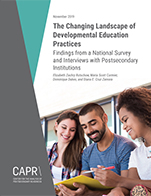National Survey of Two- and Four-Year Colleges Shows Rise in Developmental Education Reform, Yet New Practices Typically Reach Less Than Half of Students
Contacts:
-
John Hutchins, MDRC, 212-340-8604, john.hutchins@mdrc.org
- Lisa Ganga, Community College Research Center, 212-678-3394, ganga@tc.edu
 (New York City, November 15, 2019) — A new national survey of two- and four-year colleges reveals that the reform of developmental (or remedial) education practices has accelerated, including a 30-percentage-point increase in the use of alternative assessment measures (like grade point averages), rather than relying only on standardized tests. There’s also been greater experimentation with instructional reforms, including:
(New York City, November 15, 2019) — A new national survey of two- and four-year colleges reveals that the reform of developmental (or remedial) education practices has accelerated, including a 30-percentage-point increase in the use of alternative assessment measures (like grade point averages), rather than relying only on standardized tests. There’s also been greater experimentation with instructional reforms, including:
-
compressing developmental courses into shorter periods,
-
diversifying math courses that align with students’ careers,
-
allowing students to determine their own learning pace, and
-
integrating developmental reading and writing instruction into one course.
However, the survey also found that the reforms, while widespread, typically reach less than half of the developmental education students at the colleges who might benefit from them. A report on the survey results was released by the Center for the Analysis of Postsecondary Readiness (CAPR), a collaboration of MDRC and the Community College Research Center at Columbia University’s Teachers College. The findings will be discussed at CAPR’s upcoming conference, “Reimagining Developmental Education,” on November 21-22 in New York City.
The Challenge of Developmental Education
The challenges with developmental education in the United States have become well known to academic administrators and policymakers over the past decade. Research suggests that far more students are referred to developmental education courses than necessary: up to 70 percent of entering college students are advised to take developmental courses before entering college-level classes. In two-year colleges, in particular, most students wind up in these courses — and very few ever complete them. Because developmental education remains a serious barrier to students’ successful completion of college, many educators are seeking both to refer fewer students unnecessarily to developmental education and to reform the way developmental education is taught.
More Details from the CAPR Survey
The study findings come from a survey disseminated in 2016 to a nationally representative, random sample of 1,055 broad-access two-year and four-year colleges, universities, and postsecondary systems and from interviews with 127 college faculty, staff, administrators, and system leaders from 83 two-year and four-year colleges, college systems, and state-level higher education governing bodies. Highlights include:
-
Most two-year and four-year public colleges offer developmental courses, though their prevalence is much higher at two-year colleges. Multi-semester, prerequisite sequences make up a substantial proportion of these courses at both types of institutions.
-
Since 2011, there has been a 30-percentage-point increase in the proportion of colleges using multiple measures to assess students’ college readiness, including high school grade point averages. In 2011, 27 percent of two-year and four-year colleges reported using multiple measures. In 2016, 57 percent of two-year colleges and 63 percent of four-year colleges did.
-
A majority of two-year colleges are offering at least one section of multiple math pathways, self-paced math courses, integrated reading and writing, and corequisite developmental reading and writing courses and compressed courses in all subject areas. Though somewhat less common, substantial proportions of four-year colleges also use these approaches. However, these approaches tend to make up less than half of colleges’ overall developmental course offerings.
-
Both public two-year and four-year colleges offer multiple types of support services for students in developmental courses, particularly in developmental math, although their uptake is higher within two-year colleges.
- Developmental education is much less prevalent at private, nonprofit four-year colleges, and their implementation of different approaches to assessment, instruction, and supports varies.
“The call for developmental education reform has been strong over the past several years. The results from this survey reveal that colleges are heeding these calls as the pace of developmental education reform —particularly in the use of multiple measures of assessment — has accelerated,” said Elizabeth Zachry Rutschow, senior research associate at MDRC and lead author of the study. “We hope that our survey findings will serve as a catalyst for furthering these efforts and as foundation for documenting changes in colleges’ developmental education practices in the years to come.”
About the CAPR Conference
At the CAPR conference on November 21 and 22, policymakers, educators, researchers, students, and others will come together and exchange ideas about promising reforms to developmental education. Attendees will discuss the latest research in the field — including results from major studies in math pathways and developmental placement — and come away with a clearer sense of how states and institutions can better support students on the path to college and career success. The plenary sessions and keynote speeches will be livestreamed at postsecondaryreadiness.org/capr2019.
The conference is sponsored by the Institute of Education Sciences and is co-sponsored by Strong Start to Finish, Ascendium Education Group, and The Joyce Foundation. Strong Start to Finish, an initiative of Education Commission of the States, is a network of like-minded individuals and organizations from the policy, research, and practice spaces who’ve come together for one reason — to help all students, not just the select few, find success in postsecondary education.
* * *
The Center for the Analysis of Postsecondary Readiness (CAPR) is a National Research and Development Center led by the Community College Research Center (CCRC), Teachers College, Columbia University, and MDRC to study developmental education and provide evidence for promising reforms. The Center is funded by the Institute of Education Sciences (IES), U.S. Department of Education, through Grant R305C140007 to Teachers College, Columbia University. IES provided $10 million (91 percent) of funding for the center, and non-governmental sources provided an additional $1 million (9 percent).






